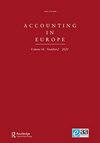Prudence and Directive 34 – Reality and Rhetoric in Accounting Regulation
IF 4.3
Q1 BUSINESS, FINANCE
引用次数: 4
Abstract
Abstract We explore the concept of prudence consistent with Directive 34/2013. There are three strands to our argument: economic, regulatory and legal. From an economic perspective, we demonstrate that neither historical cost nor fair value are designed to achieve long-run operational stability. Regarding regulation, we show that Directive 34 has significantly changed the concept and implications of prudence, in the name of increasing usefulness and relevance. Our legal considerations centre on the Gimle case of 2013, applying its logic to the new regulatory scenario. We note also the concept of the ‘European Public Good’. At various times the EU has suggested four specific components: protection of financial stability, the lack of hindrance to the economic development of the Union, and the objectives of sustainability and long-term investment. To achieve these objectives within the EU we show that it is necessary to follow the logic of our arguments.审慎与第34号指令-会计监管中的现实与修辞
摘要:我们探讨了与第34/2013号指令一致的审慎概念。我们的论点有三个方面:经济、监管和法律。从经济角度来看,我们证明历史成本和公允价值都不是为了实现长期运营稳定性而设计的。关于监管,我们表明第34号指令以增加有用性和相关性的名义显著改变了审慎的概念和含义。我们的法律考量集中在2013年的金勒案上,将其逻辑应用于新的监管情景。我们还注意到“欧洲公共利益”的概念。在不同的时期,欧盟提出了四个具体的组成部分:保护金融稳定,不阻碍欧盟的经济发展,以及可持续发展和长期投资的目标。为了在欧盟内部实现这些目标,我们表明有必要遵循我们论点的逻辑。
本文章由计算机程序翻译,如有差异,请以英文原文为准。
求助全文
约1分钟内获得全文
求助全文

 求助内容:
求助内容: 应助结果提醒方式:
应助结果提醒方式:


